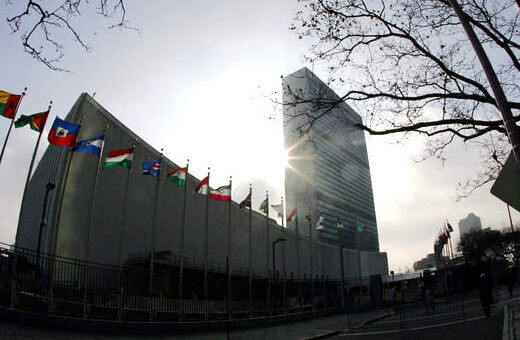hankyoreh
Links to other country sites 다른 나라 사이트 링크
Follow through scant on U.N. resolution

A U.N. resolution adopted just after North Korea’s nuclear weapons test in October has made little real impact, as the international community has not prepared plans to efficiently and effectively carry out the bans and sanctions specified.
Only 45 of the U.N.’s 192 member countries, including South Korea, the U.S., and Japan, submitted their plans for execution of the U.N. sanctions within a month of the resolution’s October 14 adoption, a requirement stipulated in its terms. This figure includes only one-fourth of the nations in the European Union. In fact, U.N. committee in charge of carrying out the resolution has not prepared an execution plan itself, either.
Under resolution 1718, adopted only five days after the North went ahead with its first-ever nuclear weapons test, among other economic sanctions, member nations are advised to impose a ban on the movement to and from North Korea of materials which could be used in weapons of mass destruction, along with luxury items. The U.N. committee, however, has not discussed in full which items should be on the banned item list, while leaving the decision on "luxury products" to the discretion of individual countries.
Some observers said behind the lact of impetus surrounding the U.N. resolution lies a sea change in the atmosphere surrounding the North Korea nuclear crisis from one of "containment" to one of "dialogue." This change, observers say, follows on the heels of the Democrats taking the majority in U.S. Congress in recent mid-term elections and the North returning to the six-nation talks aimed at ending its nuclear weapons program.
Another possible reason cited is a change in attitude by China. Beijing went as far as to suspend North Korea-related transactions at some of its banks after the October nuclear test - a rare move for the country which has in previous six-party talks worked to soften the rhetoric of planned U.S.-Japan sanctions against the North. Now, China, along with Russia, is seen as preferring a "wait-and-see" stance until the end of the multilateral talks. In line with this, China has restored nearly all North Korean banking rights and made no additional moves to stifle North Korean trade for the past several months.
However, some officials noted that it is too early to ring the resolution’s death knell. "The North has earned around US$500 million to $1 billion from sales of its weapons of mass destruction every year. These exports will likely be seriously affected by the U.N. resolution," said an official with the South Korean government, asking to remain anonymous.
Please direct questions or comments to [englishhani@hani.co.kr]
Editorial・opinion
![[Column] Has Korea, too, crossed the Rubicon on China? [Column] Has Korea, too, crossed the Rubicon on China?](https://flexible.img.hani.co.kr/flexible/normal/500/300/imgdb/original/2024/0419/9317135153409185.jpg) [Column] Has Korea, too, crossed the Rubicon on China?
[Column] Has Korea, too, crossed the Rubicon on China?![[Correspondent’s column] In Japan’s alliance with US, echoes of its past alliances with UK [Correspondent’s column] In Japan’s alliance with US, echoes of its past alliances with UK](https://flexible.img.hani.co.kr/flexible/normal/500/300/imgdb/original/2024/0419/2317135166563519.jpg) [Correspondent’s column] In Japan’s alliance with US, echoes of its past alliances with UK
[Correspondent’s column] In Japan’s alliance with US, echoes of its past alliances with UK- [Editorial] Does Yoon think the Korean public is wrong?
- [Editorial] As it bolsters its alliance with US, Japan must be accountable for past
- [Guest essay] Amending the Constitution is Yoon’s key to leaving office in public’s good graces
- [Editorial] 10 years on, lessons of Sewol tragedy must never be forgotten
- [Column] A death blow to Korea’s prosecutor politics
- [Correspondent’s column] The US and the end of Japanese pacifism
- [Guest essay] How Korea turned its trainee doctors into monsters
- [Guest essay] As someone who helped forge Seoul-Moscow ties, their status today troubles me
Most viewed articles
- 1[Column] The clock is ticking for Korea’s first lady
- 2Samsung barricades office as unionized workers strike for better conditions
- 3[Correspondent’s column] In Japan’s alliance with US, echoes of its past alliances with UK
- 4After 2 months of delayed, denied medical care, Koreans worry worst may be yet to come
- 5[Column] Has Korea, too, crossed the Rubicon on China?
- 6Hong Se-hwa, voice for tolerance whose memoir of exile touched a chord, dies at 76
- 7US overtakes China as Korea’s top export market, prompting trade sanction jitters
- 8All eyes on Xiaomi after it pulls off EV that Apple couldn’t
- 9[Photo] Smile ambassador, you’re on camera
- 10[News analysis] After elections, prosecutorial reform will likely make legislative agenda